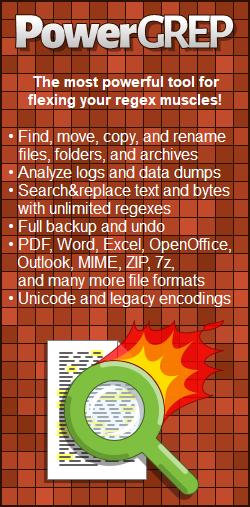| Regex Tools |
| grep |
| PowerGREP |
| RegexBuddy |
| RegexMagic |
| General Applications |
| EditPad Lite |
| EditPad Pro |
| Google Docs |
| Google Sheets |
| LibreOffice |
| Notepad++ |
| Databases |
| Google BigQuery |
| MySQL |
| Oracle |
| PostgreSQL |
Using Regular Expressions with C#
C#, together with Visual Basic, is one of the foundational programming languages of the Microsoft .NET framework. See the topic about .NET to learn more about the classes in the Systems.Text.RegularExpressions namespace. When you put it all together, you could check whether a regex can match a string in C# with a code snippet like this:
using System.Text.RegularExpressions; try { Regex regexObj = new Regex(@"\A\w+\z"); if (regexObj.IsMatch(subjectString)) { // Successful match } else { // Match attempt failed } } catch (ArgumentException ex) { // Syntax error in the regular expression } Regular Expressions, Literal Strings, and Backslashes
In literal C# strings, as well as in C++ and many other .NET languages, the backslash is an escape character. The literal string "\\" is a single backslash. In regular expressions, the backslash is also an escape character. The regular expression \\ matches a single backslash. This regular expression as a C# string, becomes "\\\\". That’s right: 4 backslashes to match a single one.
The regex \w matches a word character. As a C# string, this is written as "\\w".
To make your code more readable, you should use C# verbatim strings. In a verbatim string, a backslash is an ordinary character. This allows you to write the regular expression in your C# code as you would write it a tool like RegexBuddy or PowerGREP, or as the user would type it into your application. The regex to match a backlash is written as @"\\" when using C# verbatim strings. The backslash is still an escape character in the regular expression, so you still need to double it. But doubling is better than quadrupling. To match a word character, use the verbatim string @"\w".
If you use RegexOptions.IgnorePatternWhitespace to format your regular expression with extra whitespace and line breaks for readability then you should definitely use verbatim strings. They can span across multiple lines, treating line breaks as literal characters.
| Quick Start | Tutorial | Search & Replace | Tools & Languages | Examples | Reference |
| grep | PowerGREP | RegexBuddy | RegexMagic |
| EditPad Lite | EditPad Pro | Google Docs | Google Sheets | LibreOffice | Notepad++ |
| Boost | C# | Delphi | F# | GNU (Linux) | Groovy | ICU (Unicode) | Java | JavaScript | .NET | PCRE (C/C++) | PCRE2 (C/C++) | Perl | PHP | POSIX | PowerShell | Python | Python.NET and IronPython | R | RE2 | Ruby | std::regex | Tcl | TypeScript | VBScript | Visual Basic 6 | Visual Basic (.NET) | wxWidgets | XML Schema | XQuery & XPath | Xojo | XRegExp |
| Google BigQuery | MySQL | Oracle | PostgreSQL |
Page URL: https://www.regular-expressions.info/csharp.html
Page last updated: 11 October 2025
Site last updated: 14 October 2025
Copyright © 2003-2025 Jan Goyvaerts. All rights reserved.

